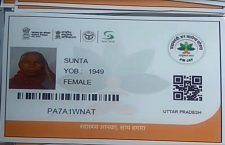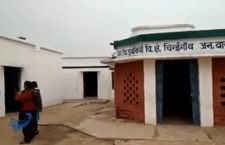The issue of triple talaqis back in the national hot seat as the Muslim Women (Protection of Rights on Marriage) Bill, 2018 – informally known as the Triple Talaq bill –was brought up for discussion in the Parliament during the recently-concluded winter session. The bill, which seeks to criminalize the Muslim practice of instantaneous divorce, was presented in the Rajya Sabha on December21, 2018, and also immediately tabled because of chaotic Upper House proceedings. It was then picked up again on 2nd January, 2019 and has been the subject of furious debates since.
Speaking with the various stakeholders on the local level in Bundelkhand, we found a situation more complex than just a divided house. Muslim women seem split on the bill, for a variety of reasons. “I think passing this bill is the right decision,” said Chitrakoot-native Mirchi, “Husbands would leave their wives at the smallest of things earlier, like if there was too little salt in the dal… But now at least he will think twice before uttering it.” She added, “I think this is great for women”. While Madina Begum, also a Chitrakoot local,was in favour, “Men could say and do whatever they wanted, women had no value. Now they won’t be able to do that.
Rizvana Parveen, Chitrakoot’s Executive District Head of BJP, agreed, perhaps not surprisingly, “This was a common practice: Say talaq three times and leave your wife, maintain the three-month iddat period, the wife would have to marry a stranger and perform her wifely duties for him, and then the ex-husband could marry a new woman.”
Although there is no clear data on triple talaq cases in India, there are some figures that help explain expound the reality of divorce among the Muslim community. An Indiaspend report analyzing 2011 Census data found that for every divorced Muslim man, there are four divorced Muslim women – indicating that the men are quicker to remarry.
Parveen highlighted what she termed as the“degrading aspect” of triple talaq,“There was this mentality that you could marry a Muslim woman whenever you wanted and leave her anytime you wanted, she had no value. Women’s respect and dignity were completed squashed.”Parveen firmly positioned the bill as a move of Muslim women’s empowerment, “The government’s bill will help women find self-respect.”
Parveen toes the party line of course – the empowerment of Muslim women has been the ruling party’s claim to push the bill. The first version, The Muslim Women (Protection of Rights on Marriage) Bill, 2017 was introduced in Lok Sabha by the Minister of Law and Justice, Mr. Ravi Shankar Prasad on December 28, 2017, shortly after the SC ruling calling triple talaq unconstitutional. Although it was strongly opposed in the Lower House, it was however, passed on the very same day because BJP had a clear majority. However, it has since been stalled and pending in the Rajya Sabha. In August 2018, further amendments were made to the bill, which are wrapped up in debate, both inside the parliament and outside.
There are many who disagree with the Centre. Gudiya from Mahoba said, “I think this rule is damaging to the women. There is little room for reconciliation, which is often a desirable option for the women.” While the amended bill specifically makes provisions for compounding, which refers to the possibility of the two parties stopping legal proceedings to settle the dispute, Gudiya makes her point, “But what about the criminal aspect? That will really sour the relationship. Usually the married couples’ families intervene and the couple makes up. But if the law is involved, then this becomes difficult.”
Rokaiya in Chitrakoot expressed concern with the impact that prison time, or even the possibility of it, will have on women’s lives, “If my husband goes to jail, and my natal family and my in-laws both refuse to take me in, where will I go?” Tabsum from Mahoba echoed Rokaiya, “With this bill, the husband goes to jail for three years. The woman is left behind with in-laws or other family, and she is more than likely to get tortured.” She added, “Children’s lives are also ruined. With their father in jail, they are completely shunned by society.”
Although the 2018 Bill specifies that there must be provisions for maintenance, the reality of alimony is a dismal one. A survey by Bharatiya Muslim Mahila Andolan revealed that 95% of divorced women received no maintenance from their husbands. And if the estranged husband is in jail, the question of receiving the due maintenance becomes nearly impossible—an even greater problem when compounded with the reality of women’s economic dependence and the general stigma around divorce in our society.
Some, like Rustom Khan, minced no words in their assessment of the bill. A local social activist, he only talks politics, “This is just Modi’s preparation for 2019 to garner the Muslim votes. This is useless for Muslim women, out of touch with their needs – it has no benefits and provides them with no safety.” He added drily, “If three months of jail time would be enough to stop a man from leaving his wife, then going to jail for murder should have eradicated murder itself. Has it?”
Sushil Kumar Shrivastav, a council member in Chitrakoot, even likened it to communal politics viewed almost five years earlier, “This is just an issue they’re raising for the upcoming elections – like they had done in 2014 with Ram Mandir.”
While the issue is being debated in the Parliament, politicians outside—especially from the Opposition—have had a lot to say. ShamimBandwi, the Banda District Head of SamjawadiParty, and a known local shayar, was quick to denounce the bill, “There is no goal for this triple talaq bill. People are making fun of it, saying this shows how little the ruling party understands the religion.”Balu Lal Chakravarti, an SP party worker in Banda added, “They are just distracting the public by turning everyone’s attention onto this one topic, to take the focus away from inflation, students, unemployment or the farmer’s crisis.”
Congress’s district head in Banda, Akhilesh Kumar Shukal, who took a less harsh stance on the need for the bill itself, said, “There is some room for improvement for the provisions of women in the Muslim personal law.” However he was not in favour of the existing bill, “Congress has said even in the previous sessions that some discussion and scrutiny of this bill is very important, because questions need to be answered.” He too tied the BJP’s push with this bill to vote bank politics and added, “BJP is really gunning for the criminalization aspect. Instead, Congress believes that we need to first address on the difficulties in the bill that arise for women, like the payment of maintenance when the husband is in jail. There are no such provisions.”
R.K. Patel, the resident BJP MLA for Mau Manikpur,who cuts a popular figure locally, was all in favour of the bill, “This is not just about Muslims”, he said, addressing the criticism that desertion is a problem for many married women regardless of religion, “I’m not talking about Hindus or Muslims, I am talking about the betterment of women.” He drew a comparison to abolishment of the Hindu practice of sati, adding, “The end of sati was great for the daughters, wives and women of the country. It gave them freedom. Similarly, Modiji is creating this amazing law for our Muslim daughters and sisters.”
As another session of the Parliament is coming to an end, The Muslim Women (Protection of Rights on Marriage) Bill, 2018 seems to be in troubled waters, facing strong resistance from the Opposition, combined with the loss of BJP ally Janta Dal. Without a majority in the Upper House, it seems unlikely that the BJP can make this their new Ram Mandir, as is the general view.
But, with the polls imminent, it doesn’t seem like they will stop trying.
This Khabar Lahariya article first appeared on Firstpost.

